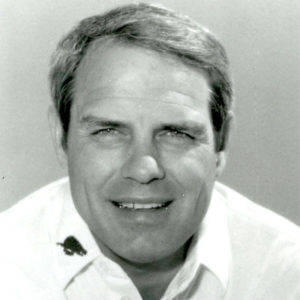calsfoundation@cals.org
Ken Hatfield (1943–)
Ken Hatfield was a football coach whose tenure included stints at the Air Force Academy, the University of Arkansas (UA) in Fayetteville (Washington County), Clemson University, and Rice University. He won many prestigious awards for his performance as a coach and administrator, including the American Football Coaches Association Coach of the Year and the Bobby Dodd Coach of the Year, both in 1983. In 2015, he received the Amos Alonzo Stagg Award, given to exemplary individuals, groups, or institutions that have advanced the best interests of football.
Kenneth Wahl Hatfield was born in Helena (Phillips County) on June 6, 1943, to Justus Franklin Hatfield and Lillian Wahl Hatfield. (Artist Lester Gene Hatfield was his father’s brother.) Following his parents’ divorce in 1956, Kenneth and older brother Dick, along with their mother, who was a church organist, moved into the J. F. Wahl home in Helena.
A standout athlete in his hometown, Hatfield credited junior high and high school coaches for keeping him on a straight moral path and developing him into an exemplary student-athlete and spiritual young man. He went on to attend UA, where he starred on the school’s successful 1964 team. His runback of a punt for a touchdown against the top-ranked University of Texas on October 17, 1964, was among his most memorable moments as a collegiate player. The unbeaten 1964 squad remains the only national championship football team in Razorback history. Hatfield graduated from UA with a degree in business and accounting in 1965, after his playing career ended.
Hatfield began his coaching career in his hometown. With time to spare before joining the U.S. Army artillery school, he served as an assistant coach at his old high school. At artillery training in El Paso, Texas, he learned that the U.S. Military Academy at West Point needed coaching help with its football team. The army changed Hatfield’s orders so that he could serve as an assistant coach and recruiter at West Point instead of being deployed to South Korea, a change Hatfield endorsed.
With collegiate coaching experience under his belt, Hatfield moved on to serve as an assistant coach at the University of Tennessee from 1968 to 1970 and the University of Florida from 1971 to 1977. Hatfield’s big break came in 1978 when the Air Force Academy (AFA) hired him as offensive coordinator. He then advanced to the head coaching job when it opened in 1979. His Falcon teams finished 4–18–1 in his first two years, but he later turned AFA into a winning team. At the time of his departure in 1983, the academy had risen to thirteenth in the coaches’ poll; this was the first time the school had finished nationally ranked since 1970.
His success at AFA prepared him to coach at his alma mater. He led UA to a record of 55–17–1, claiming two Southwest Conference championships and securing six bowl bids. The .760 winning percentage over six seasons was still a school record in 2023.
After the 1989 season, Hatfield left to become the coach at Clemson University in South Carolina. Hatfield helped turn the program around; his teams went 32–13–1 and won the 1993 Peach Bowl.
Hatfield’s most difficult coaching assignment was at Rice University in Houston, Texas, where he served from 1994 to 2005. The school was famous for being non-competitive in the rugged Southwest Conference and struggled to attract fans to attend games in Rice Stadium. In addition, Houston was a sports town dominated by professional teams and the cross-town rival University of Houston. Recruiting players was also challenging due to the academic requirements at Rice. Despite these obstacles, Hatfield led Rice to a share of the Southwest Conference title in 1994. Overall, he had three winning seasons at Rice; his teams were declared bowl eligible in each of these seasons.
In 2018, Hatfield was appointed to the college football playoff selection committee to select the four schools participating in the post-season playoffs.
Hatfield retired from coaching in November 2005. He moved to Springdale (Washington and Benton counties) in 2006 along with his wife, Sandy Wright Hatfield. She died of cancer in 2009; the couple had no children. Hatfield later married Cyndi Spencer, the widow of a Springdale business owner.
For additional information:
Fairbanks, Dave. “Clemson Coach Proves Selflessness.” Daily Press.com, September 4, 1990. https://www.dailypress.com/news/dp-xpm-19900905-1990-09-05-9009040365-story.html (accessed April 29, 2023).
Lockwood, Frank E. “Who Let the Hog In?” Arkansas Democrat-Gazette, August 13, 2022, pp. 4B, 5B. Online at https://www.arkansasonline.com/news/2022/aug/13/plenty-of-pork-and-a-hogs-legend-add-to-festive/ (accessed April 29, 2023).
Smith, Doug. “Ken Hatfield: Coach.” Arkansas Times, December 14, 2006. Online at https://arktimes.com/general/top-stories/2006/12/14/ken-hatfield-coach (accessed April 29, 2023).
Stan Weeber
McNeese State University
 Divergent Prosperity and the Arc of Reform, 1968–2022
Divergent Prosperity and the Arc of Reform, 1968–2022 Recreation and Sports
Recreation and Sports Ken Hatfield
Ken Hatfield 




Comments
No comments on this entry yet.